Essay on Professional Identity in Nursing and Healthcare Services
VerifiedAdded on 2019/09/27
|9
|2019
|412
Essay
AI Summary
This essay delves into the concept of professional identity within the nursing profession in Australia, emphasizing its role in delivering quality healthcare services. It defines professional identity and highlights the significance of ethical healthcare practices. The essay examines the key roles of the Nursing and Midwifery Board of Australia (NMBA) in setting standards, guidelines, and codes of practice for registered nurses, including codes of conduct, standards for practice, and codes of ethics. It explains how these standards guide professional practice and ensure quality care, and discusses the NMBA's monitoring of healthcare service quality. The essay underscores the importance of these regulations in maintaining high standards and promoting patient satisfaction within the Australian healthcare system, referencing key documents and publications from the NMBA and other relevant organizations.
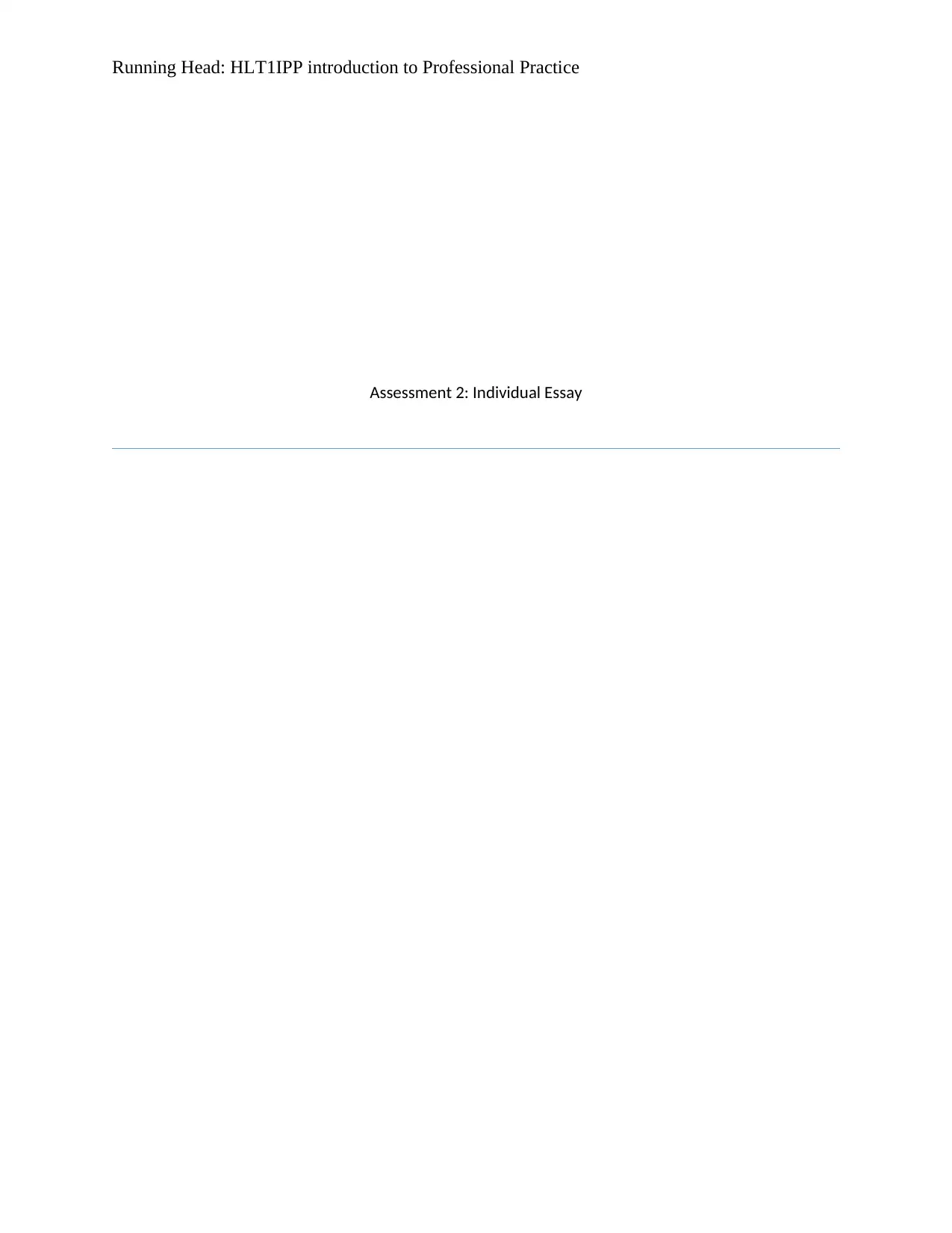
Running Head: HLT1IPP introduction to Professional Practice
Assessment 2: Individual Essay
Assessment 2: Individual Essay
Paraphrase This Document
Need a fresh take? Get an instant paraphrase of this document with our AI Paraphraser
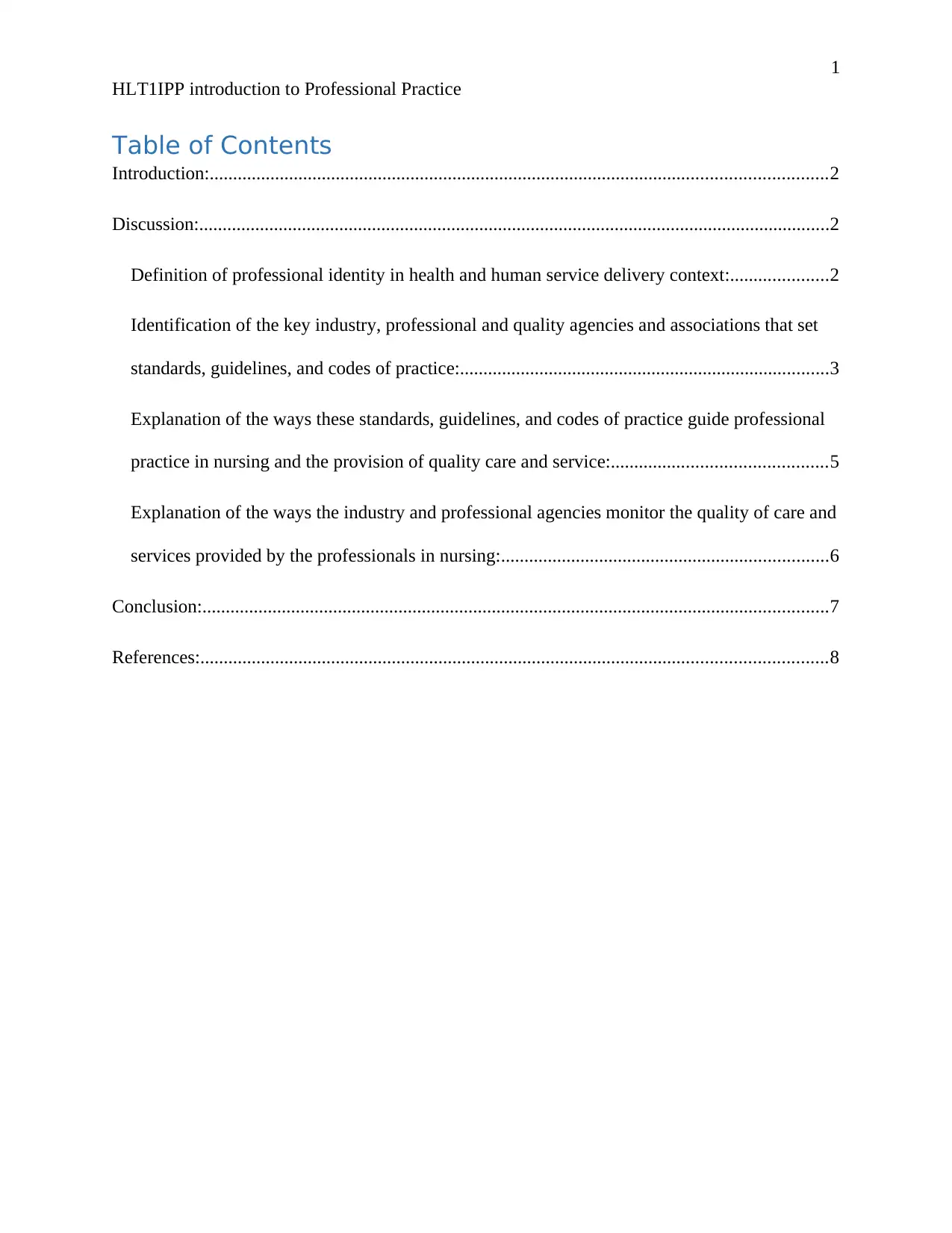
1
HLT1IPP introduction to Professional Practice
Table of Contents
Introduction:....................................................................................................................................2
Discussion:.......................................................................................................................................2
Definition of professional identity in health and human service delivery context:.....................2
Identification of the key industry, professional and quality agencies and associations that set
standards, guidelines, and codes of practice:...............................................................................3
Explanation of the ways these standards, guidelines, and codes of practice guide professional
practice in nursing and the provision of quality care and service:..............................................5
Explanation of the ways the industry and professional agencies monitor the quality of care and
services provided by the professionals in nursing:......................................................................6
Conclusion:......................................................................................................................................7
References:......................................................................................................................................8
HLT1IPP introduction to Professional Practice
Table of Contents
Introduction:....................................................................................................................................2
Discussion:.......................................................................................................................................2
Definition of professional identity in health and human service delivery context:.....................2
Identification of the key industry, professional and quality agencies and associations that set
standards, guidelines, and codes of practice:...............................................................................3
Explanation of the ways these standards, guidelines, and codes of practice guide professional
practice in nursing and the provision of quality care and service:..............................................5
Explanation of the ways the industry and professional agencies monitor the quality of care and
services provided by the professionals in nursing:......................................................................6
Conclusion:......................................................................................................................................7
References:......................................................................................................................................8
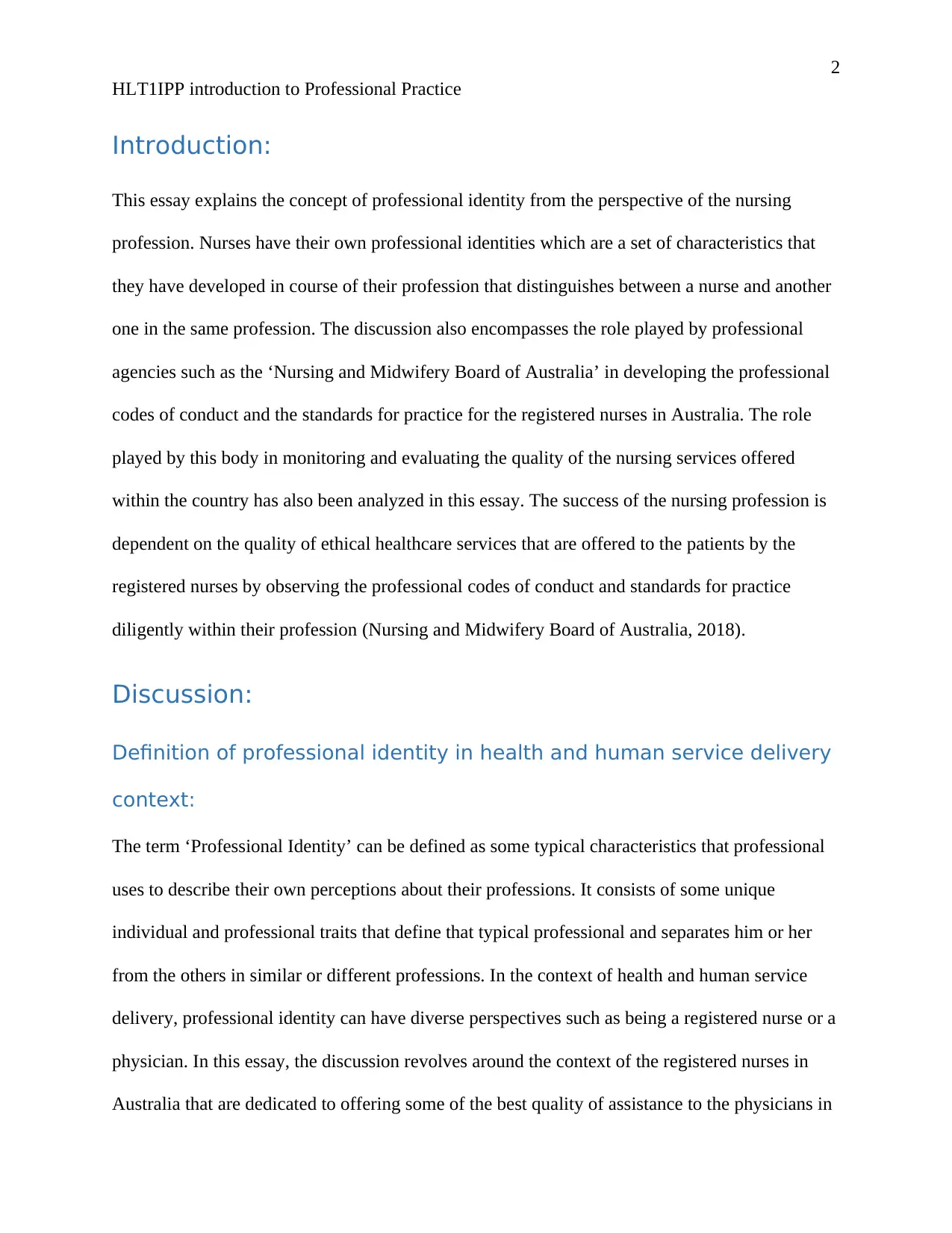
2
HLT1IPP introduction to Professional Practice
Introduction:
This essay explains the concept of professional identity from the perspective of the nursing
profession. Nurses have their own professional identities which are a set of characteristics that
they have developed in course of their profession that distinguishes between a nurse and another
one in the same profession. The discussion also encompasses the role played by professional
agencies such as the ‘Nursing and Midwifery Board of Australia’ in developing the professional
codes of conduct and the standards for practice for the registered nurses in Australia. The role
played by this body in monitoring and evaluating the quality of the nursing services offered
within the country has also been analyzed in this essay. The success of the nursing profession is
dependent on the quality of ethical healthcare services that are offered to the patients by the
registered nurses by observing the professional codes of conduct and standards for practice
diligently within their profession (Nursing and Midwifery Board of Australia, 2018).
Discussion:
Definition of professional identity in health and human service delivery
context:
The term ‘Professional Identity’ can be defined as some typical characteristics that professional
uses to describe their own perceptions about their professions. It consists of some unique
individual and professional traits that define that typical professional and separates him or her
from the others in similar or different professions. In the context of health and human service
delivery, professional identity can have diverse perspectives such as being a registered nurse or a
physician. In this essay, the discussion revolves around the context of the registered nurses in
Australia that are dedicated to offering some of the best quality of assistance to the physicians in
HLT1IPP introduction to Professional Practice
Introduction:
This essay explains the concept of professional identity from the perspective of the nursing
profession. Nurses have their own professional identities which are a set of characteristics that
they have developed in course of their profession that distinguishes between a nurse and another
one in the same profession. The discussion also encompasses the role played by professional
agencies such as the ‘Nursing and Midwifery Board of Australia’ in developing the professional
codes of conduct and the standards for practice for the registered nurses in Australia. The role
played by this body in monitoring and evaluating the quality of the nursing services offered
within the country has also been analyzed in this essay. The success of the nursing profession is
dependent on the quality of ethical healthcare services that are offered to the patients by the
registered nurses by observing the professional codes of conduct and standards for practice
diligently within their profession (Nursing and Midwifery Board of Australia, 2018).
Discussion:
Definition of professional identity in health and human service delivery
context:
The term ‘Professional Identity’ can be defined as some typical characteristics that professional
uses to describe their own perceptions about their professions. It consists of some unique
individual and professional traits that define that typical professional and separates him or her
from the others in similar or different professions. In the context of health and human service
delivery, professional identity can have diverse perspectives such as being a registered nurse or a
physician. In this essay, the discussion revolves around the context of the registered nurses in
Australia that are dedicated to offering some of the best quality of assistance to the physicians in
⊘ This is a preview!⊘
Do you want full access?
Subscribe today to unlock all pages.

Trusted by 1+ million students worldwide
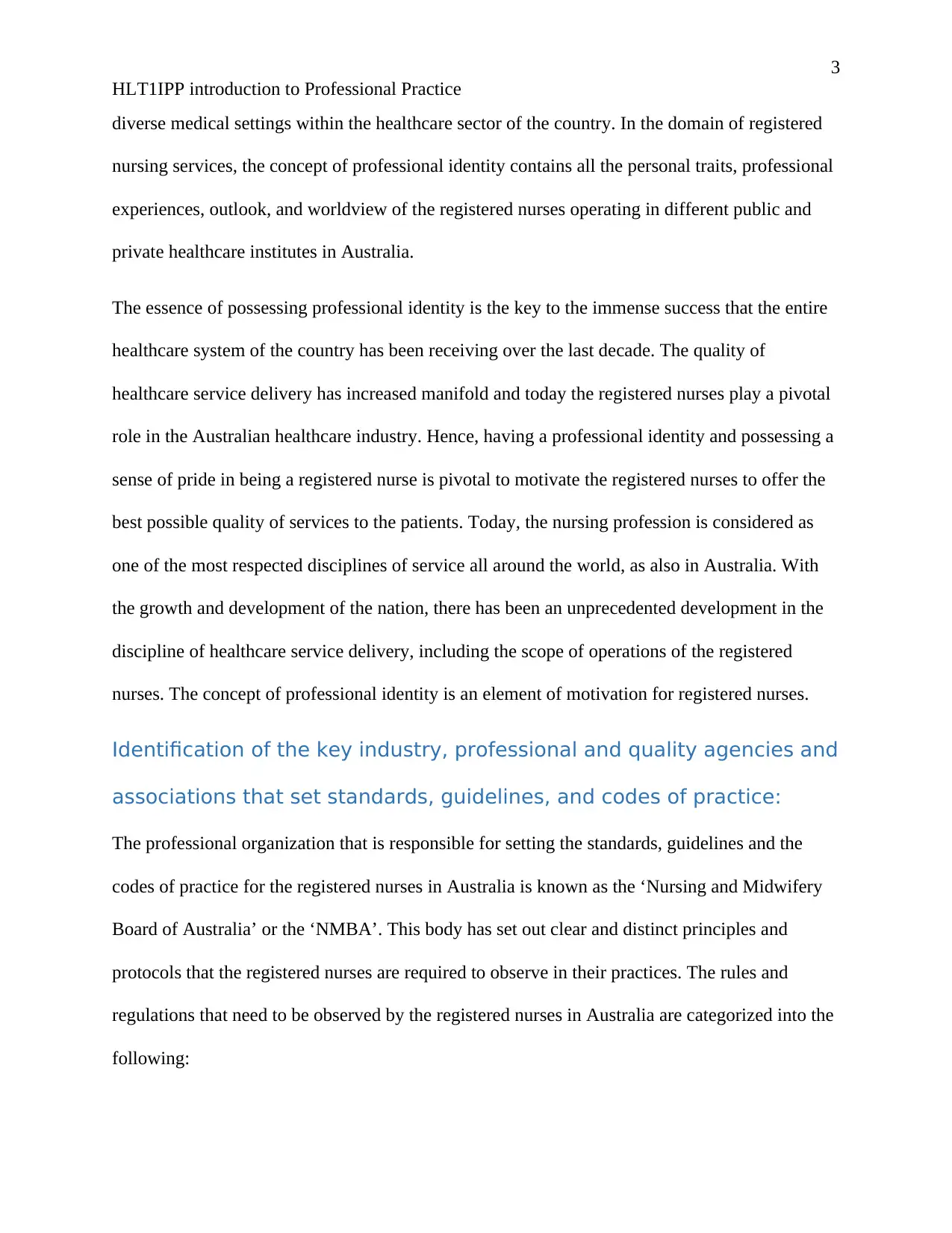
3
HLT1IPP introduction to Professional Practice
diverse medical settings within the healthcare sector of the country. In the domain of registered
nursing services, the concept of professional identity contains all the personal traits, professional
experiences, outlook, and worldview of the registered nurses operating in different public and
private healthcare institutes in Australia.
The essence of possessing professional identity is the key to the immense success that the entire
healthcare system of the country has been receiving over the last decade. The quality of
healthcare service delivery has increased manifold and today the registered nurses play a pivotal
role in the Australian healthcare industry. Hence, having a professional identity and possessing a
sense of pride in being a registered nurse is pivotal to motivate the registered nurses to offer the
best possible quality of services to the patients. Today, the nursing profession is considered as
one of the most respected disciplines of service all around the world, as also in Australia. With
the growth and development of the nation, there has been an unprecedented development in the
discipline of healthcare service delivery, including the scope of operations of the registered
nurses. The concept of professional identity is an element of motivation for registered nurses.
Identification of the key industry, professional and quality agencies and
associations that set standards, guidelines, and codes of practice:
The professional organization that is responsible for setting the standards, guidelines and the
codes of practice for the registered nurses in Australia is known as the ‘Nursing and Midwifery
Board of Australia’ or the ‘NMBA’. This body has set out clear and distinct principles and
protocols that the registered nurses are required to observe in their practices. The rules and
regulations that need to be observed by the registered nurses in Australia are categorized into the
following:
HLT1IPP introduction to Professional Practice
diverse medical settings within the healthcare sector of the country. In the domain of registered
nursing services, the concept of professional identity contains all the personal traits, professional
experiences, outlook, and worldview of the registered nurses operating in different public and
private healthcare institutes in Australia.
The essence of possessing professional identity is the key to the immense success that the entire
healthcare system of the country has been receiving over the last decade. The quality of
healthcare service delivery has increased manifold and today the registered nurses play a pivotal
role in the Australian healthcare industry. Hence, having a professional identity and possessing a
sense of pride in being a registered nurse is pivotal to motivate the registered nurses to offer the
best possible quality of services to the patients. Today, the nursing profession is considered as
one of the most respected disciplines of service all around the world, as also in Australia. With
the growth and development of the nation, there has been an unprecedented development in the
discipline of healthcare service delivery, including the scope of operations of the registered
nurses. The concept of professional identity is an element of motivation for registered nurses.
Identification of the key industry, professional and quality agencies and
associations that set standards, guidelines, and codes of practice:
The professional organization that is responsible for setting the standards, guidelines and the
codes of practice for the registered nurses in Australia is known as the ‘Nursing and Midwifery
Board of Australia’ or the ‘NMBA’. This body has set out clear and distinct principles and
protocols that the registered nurses are required to observe in their practices. The rules and
regulations that need to be observed by the registered nurses in Australia are categorized into the
following:
Paraphrase This Document
Need a fresh take? Get an instant paraphrase of this document with our AI Paraphraser
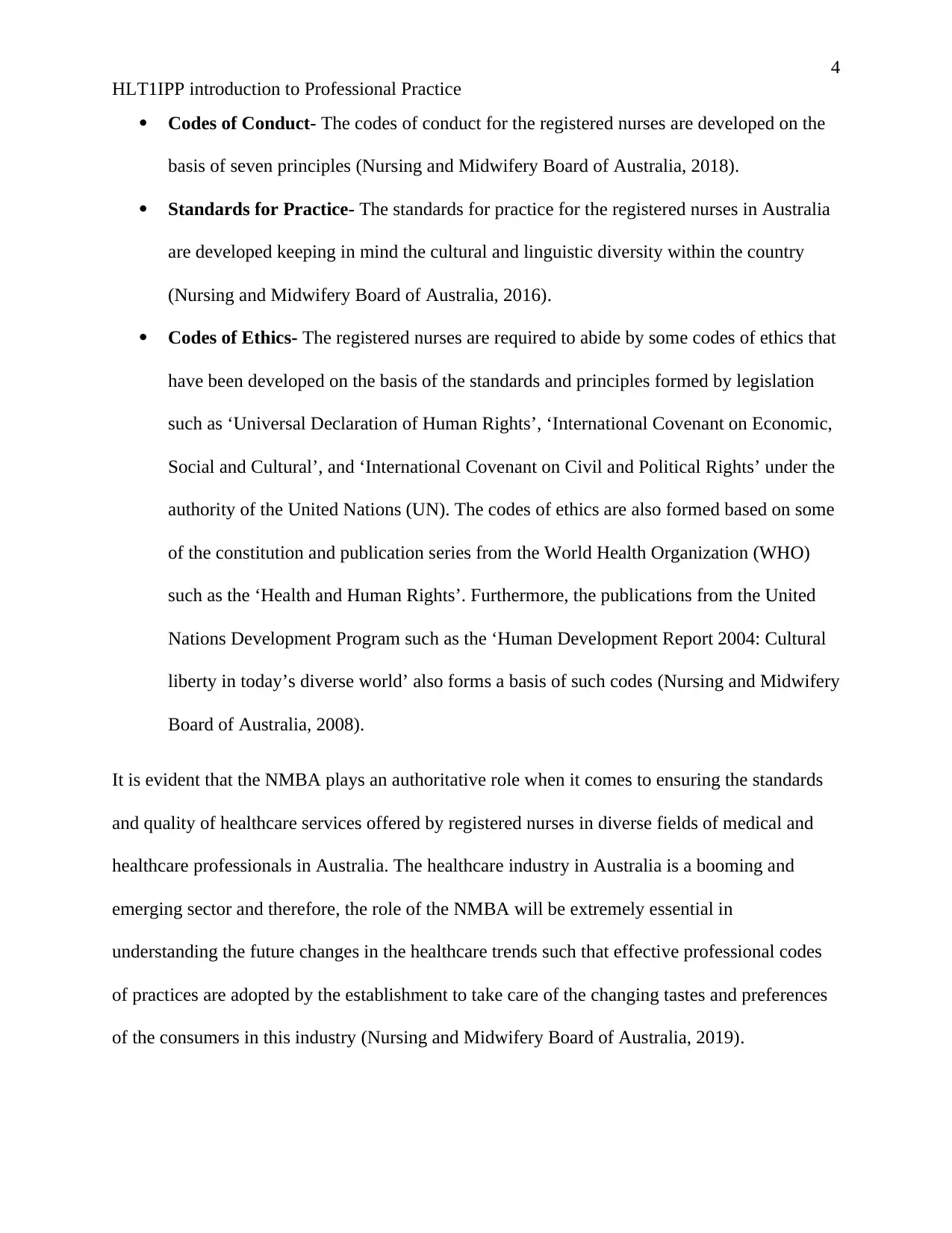
4
HLT1IPP introduction to Professional Practice
Codes of Conduct- The codes of conduct for the registered nurses are developed on the
basis of seven principles (Nursing and Midwifery Board of Australia, 2018).
Standards for Practice- The standards for practice for the registered nurses in Australia
are developed keeping in mind the cultural and linguistic diversity within the country
(Nursing and Midwifery Board of Australia, 2016).
Codes of Ethics- The registered nurses are required to abide by some codes of ethics that
have been developed on the basis of the standards and principles formed by legislation
such as ‘Universal Declaration of Human Rights’, ‘International Covenant on Economic,
Social and Cultural’, and ‘International Covenant on Civil and Political Rights’ under the
authority of the United Nations (UN). The codes of ethics are also formed based on some
of the constitution and publication series from the World Health Organization (WHO)
such as the ‘Health and Human Rights’. Furthermore, the publications from the United
Nations Development Program such as the ‘Human Development Report 2004: Cultural
liberty in today’s diverse world’ also forms a basis of such codes (Nursing and Midwifery
Board of Australia, 2008).
It is evident that the NMBA plays an authoritative role when it comes to ensuring the standards
and quality of healthcare services offered by registered nurses in diverse fields of medical and
healthcare professionals in Australia. The healthcare industry in Australia is a booming and
emerging sector and therefore, the role of the NMBA will be extremely essential in
understanding the future changes in the healthcare trends such that effective professional codes
of practices are adopted by the establishment to take care of the changing tastes and preferences
of the consumers in this industry (Nursing and Midwifery Board of Australia, 2019).
HLT1IPP introduction to Professional Practice
Codes of Conduct- The codes of conduct for the registered nurses are developed on the
basis of seven principles (Nursing and Midwifery Board of Australia, 2018).
Standards for Practice- The standards for practice for the registered nurses in Australia
are developed keeping in mind the cultural and linguistic diversity within the country
(Nursing and Midwifery Board of Australia, 2016).
Codes of Ethics- The registered nurses are required to abide by some codes of ethics that
have been developed on the basis of the standards and principles formed by legislation
such as ‘Universal Declaration of Human Rights’, ‘International Covenant on Economic,
Social and Cultural’, and ‘International Covenant on Civil and Political Rights’ under the
authority of the United Nations (UN). The codes of ethics are also formed based on some
of the constitution and publication series from the World Health Organization (WHO)
such as the ‘Health and Human Rights’. Furthermore, the publications from the United
Nations Development Program such as the ‘Human Development Report 2004: Cultural
liberty in today’s diverse world’ also forms a basis of such codes (Nursing and Midwifery
Board of Australia, 2008).
It is evident that the NMBA plays an authoritative role when it comes to ensuring the standards
and quality of healthcare services offered by registered nurses in diverse fields of medical and
healthcare professionals in Australia. The healthcare industry in Australia is a booming and
emerging sector and therefore, the role of the NMBA will be extremely essential in
understanding the future changes in the healthcare trends such that effective professional codes
of practices are adopted by the establishment to take care of the changing tastes and preferences
of the consumers in this industry (Nursing and Midwifery Board of Australia, 2019).
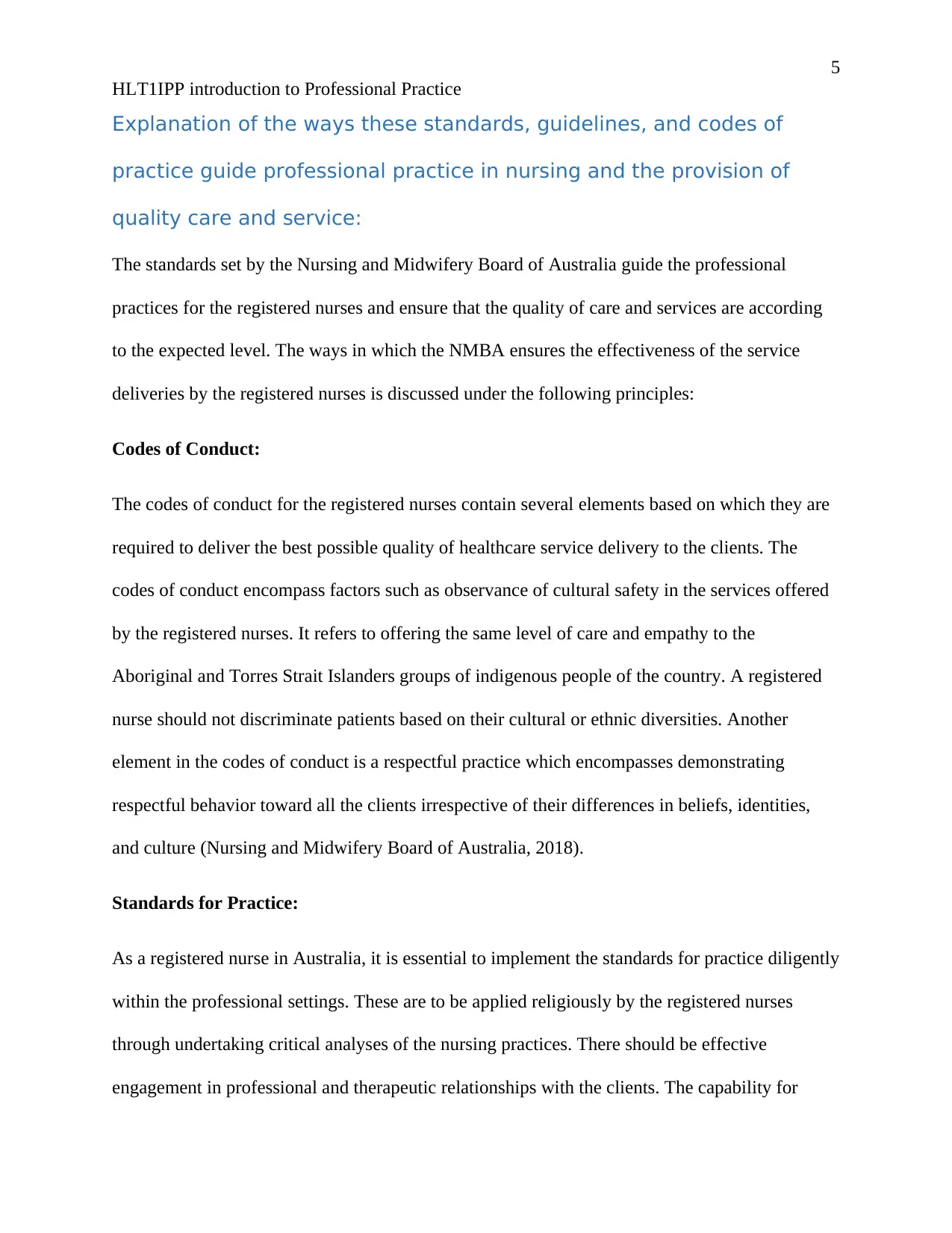
5
HLT1IPP introduction to Professional Practice
Explanation of the ways these standards, guidelines, and codes of
practice guide professional practice in nursing and the provision of
quality care and service:
The standards set by the Nursing and Midwifery Board of Australia guide the professional
practices for the registered nurses and ensure that the quality of care and services are according
to the expected level. The ways in which the NMBA ensures the effectiveness of the service
deliveries by the registered nurses is discussed under the following principles:
Codes of Conduct:
The codes of conduct for the registered nurses contain several elements based on which they are
required to deliver the best possible quality of healthcare service delivery to the clients. The
codes of conduct encompass factors such as observance of cultural safety in the services offered
by the registered nurses. It refers to offering the same level of care and empathy to the
Aboriginal and Torres Strait Islanders groups of indigenous people of the country. A registered
nurse should not discriminate patients based on their cultural or ethnic diversities. Another
element in the codes of conduct is a respectful practice which encompasses demonstrating
respectful behavior toward all the clients irrespective of their differences in beliefs, identities,
and culture (Nursing and Midwifery Board of Australia, 2018).
Standards for Practice:
As a registered nurse in Australia, it is essential to implement the standards for practice diligently
within the professional settings. These are to be applied religiously by the registered nurses
through undertaking critical analyses of the nursing practices. There should be effective
engagement in professional and therapeutic relationships with the clients. The capability for
HLT1IPP introduction to Professional Practice
Explanation of the ways these standards, guidelines, and codes of
practice guide professional practice in nursing and the provision of
quality care and service:
The standards set by the Nursing and Midwifery Board of Australia guide the professional
practices for the registered nurses and ensure that the quality of care and services are according
to the expected level. The ways in which the NMBA ensures the effectiveness of the service
deliveries by the registered nurses is discussed under the following principles:
Codes of Conduct:
The codes of conduct for the registered nurses contain several elements based on which they are
required to deliver the best possible quality of healthcare service delivery to the clients. The
codes of conduct encompass factors such as observance of cultural safety in the services offered
by the registered nurses. It refers to offering the same level of care and empathy to the
Aboriginal and Torres Strait Islanders groups of indigenous people of the country. A registered
nurse should not discriminate patients based on their cultural or ethnic diversities. Another
element in the codes of conduct is a respectful practice which encompasses demonstrating
respectful behavior toward all the clients irrespective of their differences in beliefs, identities,
and culture (Nursing and Midwifery Board of Australia, 2018).
Standards for Practice:
As a registered nurse in Australia, it is essential to implement the standards for practice diligently
within the professional settings. These are to be applied religiously by the registered nurses
through undertaking critical analyses of the nursing practices. There should be effective
engagement in professional and therapeutic relationships with the clients. The capability for
⊘ This is a preview!⊘
Do you want full access?
Subscribe today to unlock all pages.

Trusted by 1+ million students worldwide
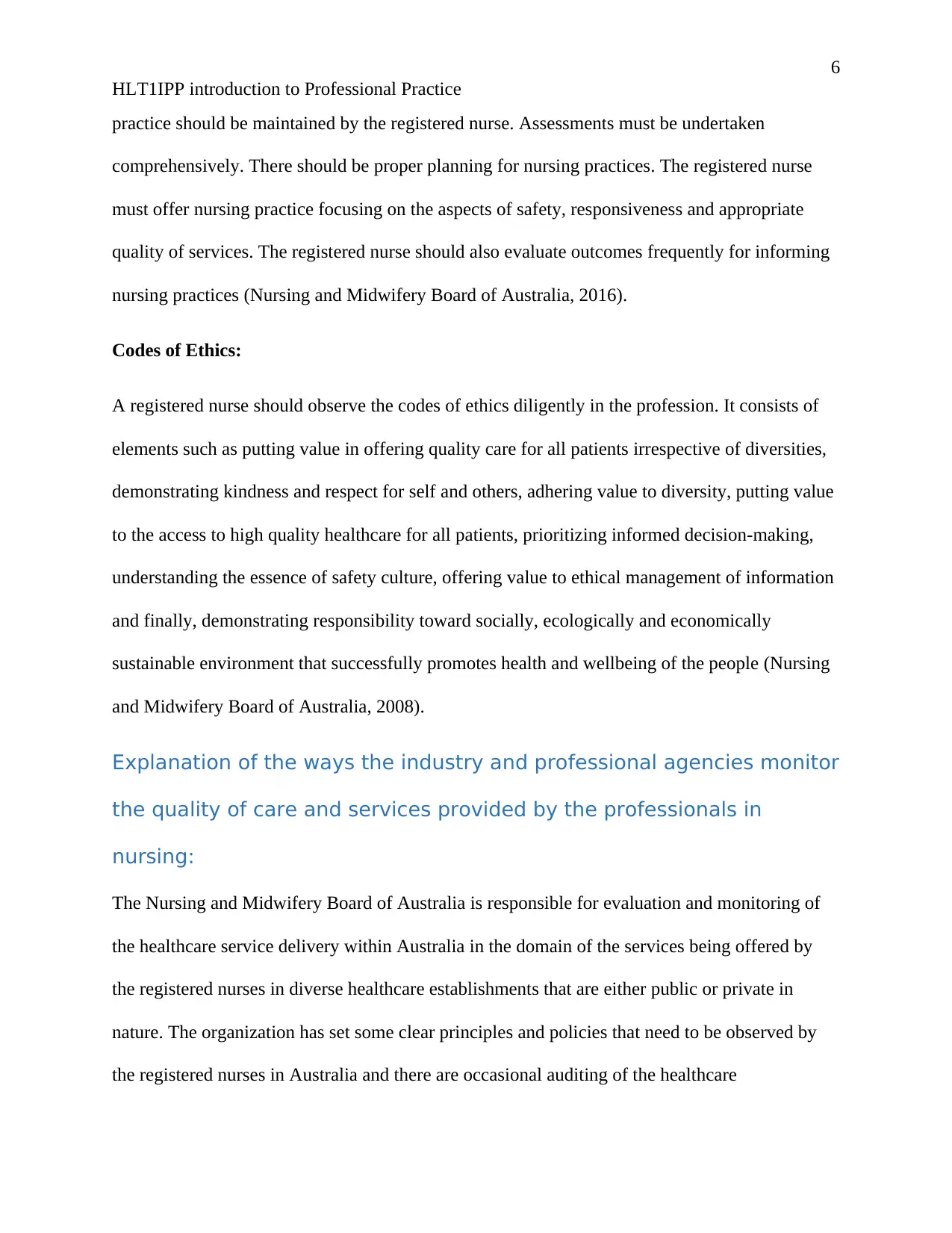
6
HLT1IPP introduction to Professional Practice
practice should be maintained by the registered nurse. Assessments must be undertaken
comprehensively. There should be proper planning for nursing practices. The registered nurse
must offer nursing practice focusing on the aspects of safety, responsiveness and appropriate
quality of services. The registered nurse should also evaluate outcomes frequently for informing
nursing practices (Nursing and Midwifery Board of Australia, 2016).
Codes of Ethics:
A registered nurse should observe the codes of ethics diligently in the profession. It consists of
elements such as putting value in offering quality care for all patients irrespective of diversities,
demonstrating kindness and respect for self and others, adhering value to diversity, putting value
to the access to high quality healthcare for all patients, prioritizing informed decision-making,
understanding the essence of safety culture, offering value to ethical management of information
and finally, demonstrating responsibility toward socially, ecologically and economically
sustainable environment that successfully promotes health and wellbeing of the people (Nursing
and Midwifery Board of Australia, 2008).
Explanation of the ways the industry and professional agencies monitor
the quality of care and services provided by the professionals in
nursing:
The Nursing and Midwifery Board of Australia is responsible for evaluation and monitoring of
the healthcare service delivery within Australia in the domain of the services being offered by
the registered nurses in diverse healthcare establishments that are either public or private in
nature. The organization has set some clear principles and policies that need to be observed by
the registered nurses in Australia and there are occasional auditing of the healthcare
HLT1IPP introduction to Professional Practice
practice should be maintained by the registered nurse. Assessments must be undertaken
comprehensively. There should be proper planning for nursing practices. The registered nurse
must offer nursing practice focusing on the aspects of safety, responsiveness and appropriate
quality of services. The registered nurse should also evaluate outcomes frequently for informing
nursing practices (Nursing and Midwifery Board of Australia, 2016).
Codes of Ethics:
A registered nurse should observe the codes of ethics diligently in the profession. It consists of
elements such as putting value in offering quality care for all patients irrespective of diversities,
demonstrating kindness and respect for self and others, adhering value to diversity, putting value
to the access to high quality healthcare for all patients, prioritizing informed decision-making,
understanding the essence of safety culture, offering value to ethical management of information
and finally, demonstrating responsibility toward socially, ecologically and economically
sustainable environment that successfully promotes health and wellbeing of the people (Nursing
and Midwifery Board of Australia, 2008).
Explanation of the ways the industry and professional agencies monitor
the quality of care and services provided by the professionals in
nursing:
The Nursing and Midwifery Board of Australia is responsible for evaluation and monitoring of
the healthcare service delivery within Australia in the domain of the services being offered by
the registered nurses in diverse healthcare establishments that are either public or private in
nature. The organization has set some clear principles and policies that need to be observed by
the registered nurses in Australia and there are occasional auditing of the healthcare
Paraphrase This Document
Need a fresh take? Get an instant paraphrase of this document with our AI Paraphraser
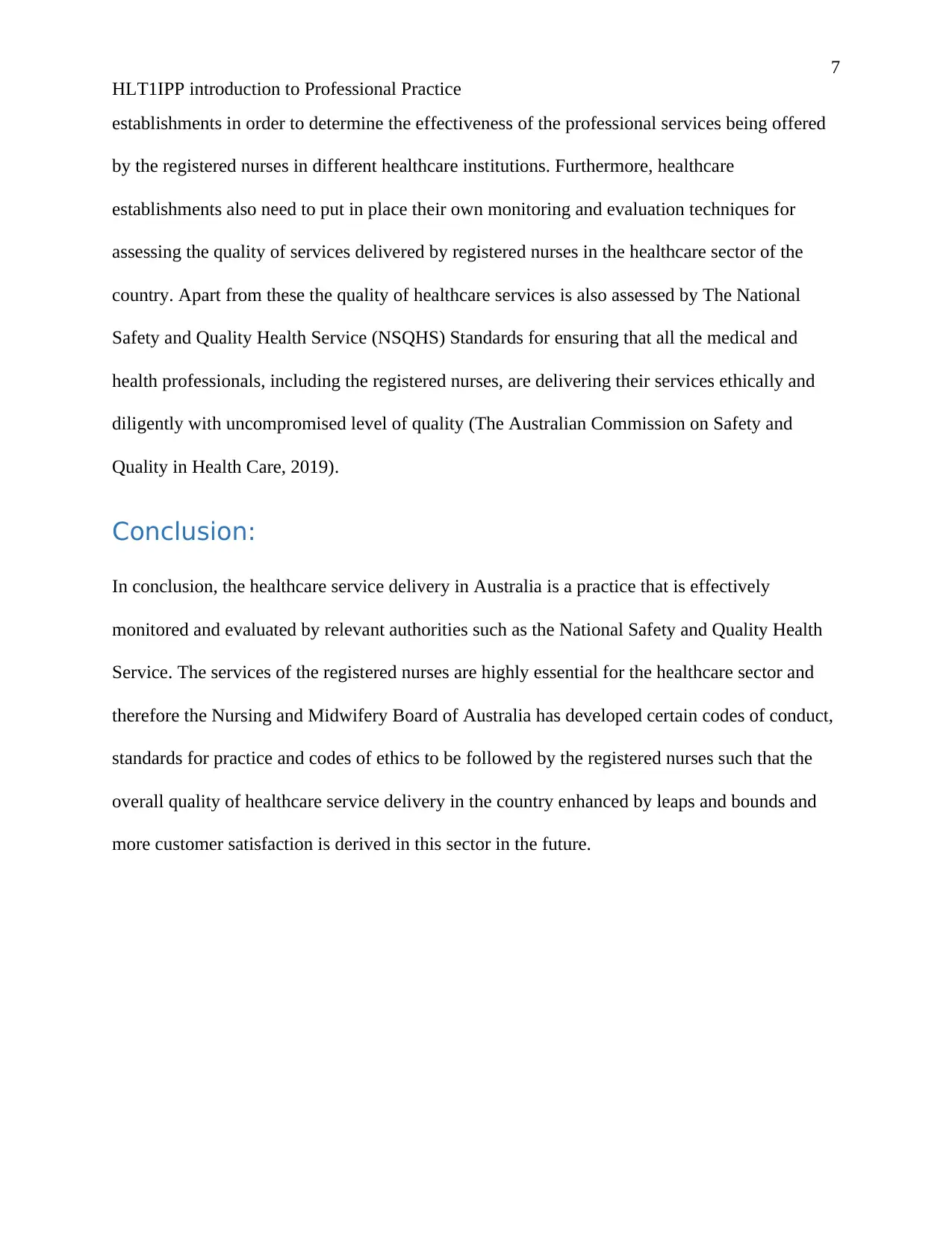
7
HLT1IPP introduction to Professional Practice
establishments in order to determine the effectiveness of the professional services being offered
by the registered nurses in different healthcare institutions. Furthermore, healthcare
establishments also need to put in place their own monitoring and evaluation techniques for
assessing the quality of services delivered by registered nurses in the healthcare sector of the
country. Apart from these the quality of healthcare services is also assessed by The National
Safety and Quality Health Service (NSQHS) Standards for ensuring that all the medical and
health professionals, including the registered nurses, are delivering their services ethically and
diligently with uncompromised level of quality (The Australian Commission on Safety and
Quality in Health Care, 2019).
Conclusion:
In conclusion, the healthcare service delivery in Australia is a practice that is effectively
monitored and evaluated by relevant authorities such as the National Safety and Quality Health
Service. The services of the registered nurses are highly essential for the healthcare sector and
therefore the Nursing and Midwifery Board of Australia has developed certain codes of conduct,
standards for practice and codes of ethics to be followed by the registered nurses such that the
overall quality of healthcare service delivery in the country enhanced by leaps and bounds and
more customer satisfaction is derived in this sector in the future.
HLT1IPP introduction to Professional Practice
establishments in order to determine the effectiveness of the professional services being offered
by the registered nurses in different healthcare institutions. Furthermore, healthcare
establishments also need to put in place their own monitoring and evaluation techniques for
assessing the quality of services delivered by registered nurses in the healthcare sector of the
country. Apart from these the quality of healthcare services is also assessed by The National
Safety and Quality Health Service (NSQHS) Standards for ensuring that all the medical and
health professionals, including the registered nurses, are delivering their services ethically and
diligently with uncompromised level of quality (The Australian Commission on Safety and
Quality in Health Care, 2019).
Conclusion:
In conclusion, the healthcare service delivery in Australia is a practice that is effectively
monitored and evaluated by relevant authorities such as the National Safety and Quality Health
Service. The services of the registered nurses are highly essential for the healthcare sector and
therefore the Nursing and Midwifery Board of Australia has developed certain codes of conduct,
standards for practice and codes of ethics to be followed by the registered nurses such that the
overall quality of healthcare service delivery in the country enhanced by leaps and bounds and
more customer satisfaction is derived in this sector in the future.
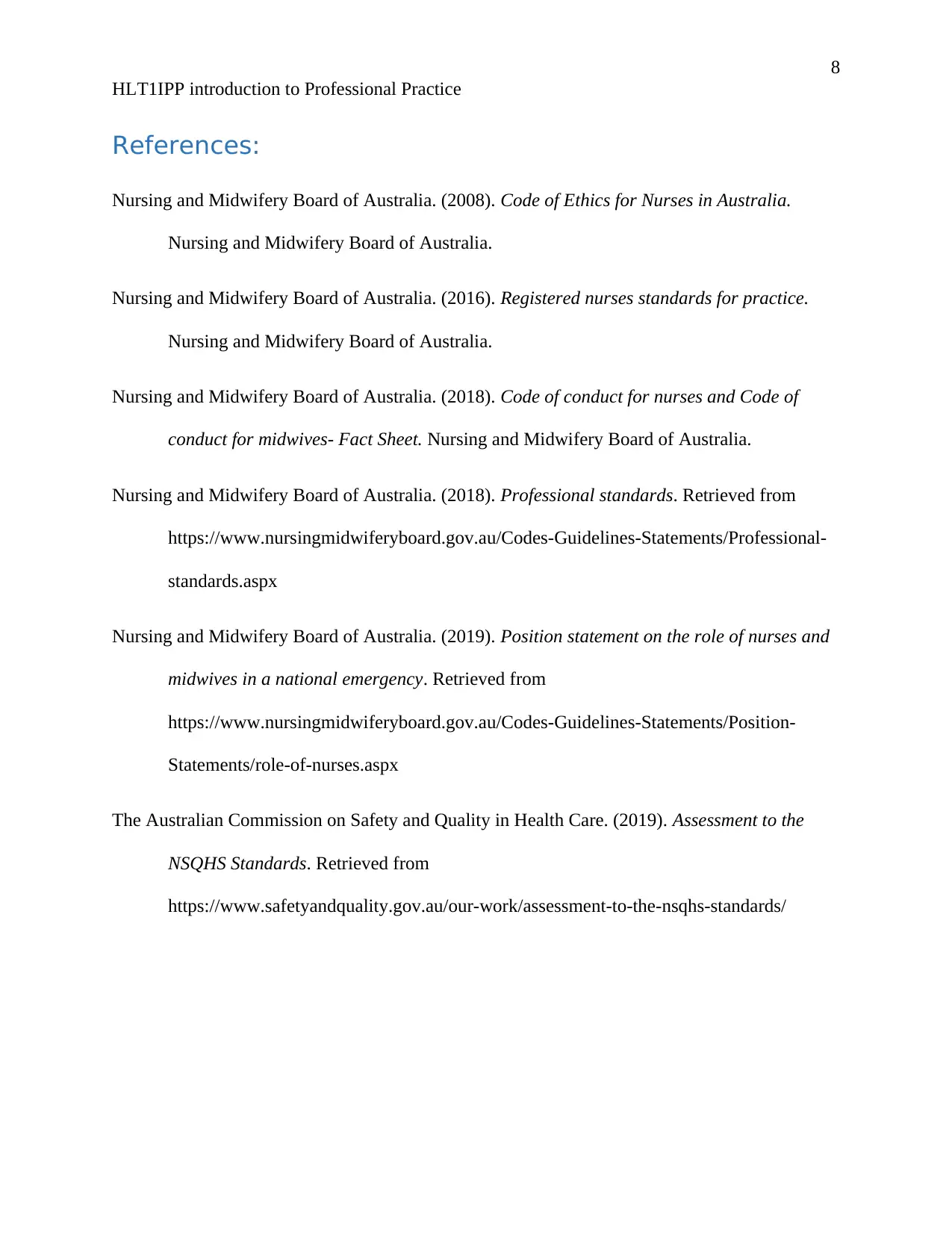
8
HLT1IPP introduction to Professional Practice
References:
Nursing and Midwifery Board of Australia. (2008). Code of Ethics for Nurses in Australia.
Nursing and Midwifery Board of Australia.
Nursing and Midwifery Board of Australia. (2016). Registered nurses standards for practice.
Nursing and Midwifery Board of Australia.
Nursing and Midwifery Board of Australia. (2018). Code of conduct for nurses and Code of
conduct for midwives- Fact Sheet. Nursing and Midwifery Board of Australia.
Nursing and Midwifery Board of Australia. (2018). Professional standards. Retrieved from
https://www.nursingmidwiferyboard.gov.au/Codes-Guidelines-Statements/Professional-
standards.aspx
Nursing and Midwifery Board of Australia. (2019). Position statement on the role of nurses and
midwives in a national emergency. Retrieved from
https://www.nursingmidwiferyboard.gov.au/Codes-Guidelines-Statements/Position-
Statements/role-of-nurses.aspx
The Australian Commission on Safety and Quality in Health Care. (2019). Assessment to the
NSQHS Standards. Retrieved from
https://www.safetyandquality.gov.au/our-work/assessment-to-the-nsqhs-standards/
HLT1IPP introduction to Professional Practice
References:
Nursing and Midwifery Board of Australia. (2008). Code of Ethics for Nurses in Australia.
Nursing and Midwifery Board of Australia.
Nursing and Midwifery Board of Australia. (2016). Registered nurses standards for practice.
Nursing and Midwifery Board of Australia.
Nursing and Midwifery Board of Australia. (2018). Code of conduct for nurses and Code of
conduct for midwives- Fact Sheet. Nursing and Midwifery Board of Australia.
Nursing and Midwifery Board of Australia. (2018). Professional standards. Retrieved from
https://www.nursingmidwiferyboard.gov.au/Codes-Guidelines-Statements/Professional-
standards.aspx
Nursing and Midwifery Board of Australia. (2019). Position statement on the role of nurses and
midwives in a national emergency. Retrieved from
https://www.nursingmidwiferyboard.gov.au/Codes-Guidelines-Statements/Position-
Statements/role-of-nurses.aspx
The Australian Commission on Safety and Quality in Health Care. (2019). Assessment to the
NSQHS Standards. Retrieved from
https://www.safetyandquality.gov.au/our-work/assessment-to-the-nsqhs-standards/
⊘ This is a preview!⊘
Do you want full access?
Subscribe today to unlock all pages.

Trusted by 1+ million students worldwide
1 out of 9
Related Documents
Your All-in-One AI-Powered Toolkit for Academic Success.
+13062052269
info@desklib.com
Available 24*7 on WhatsApp / Email
![[object Object]](/_next/static/media/star-bottom.7253800d.svg)
Unlock your academic potential
Copyright © 2020–2026 A2Z Services. All Rights Reserved. Developed and managed by ZUCOL.





